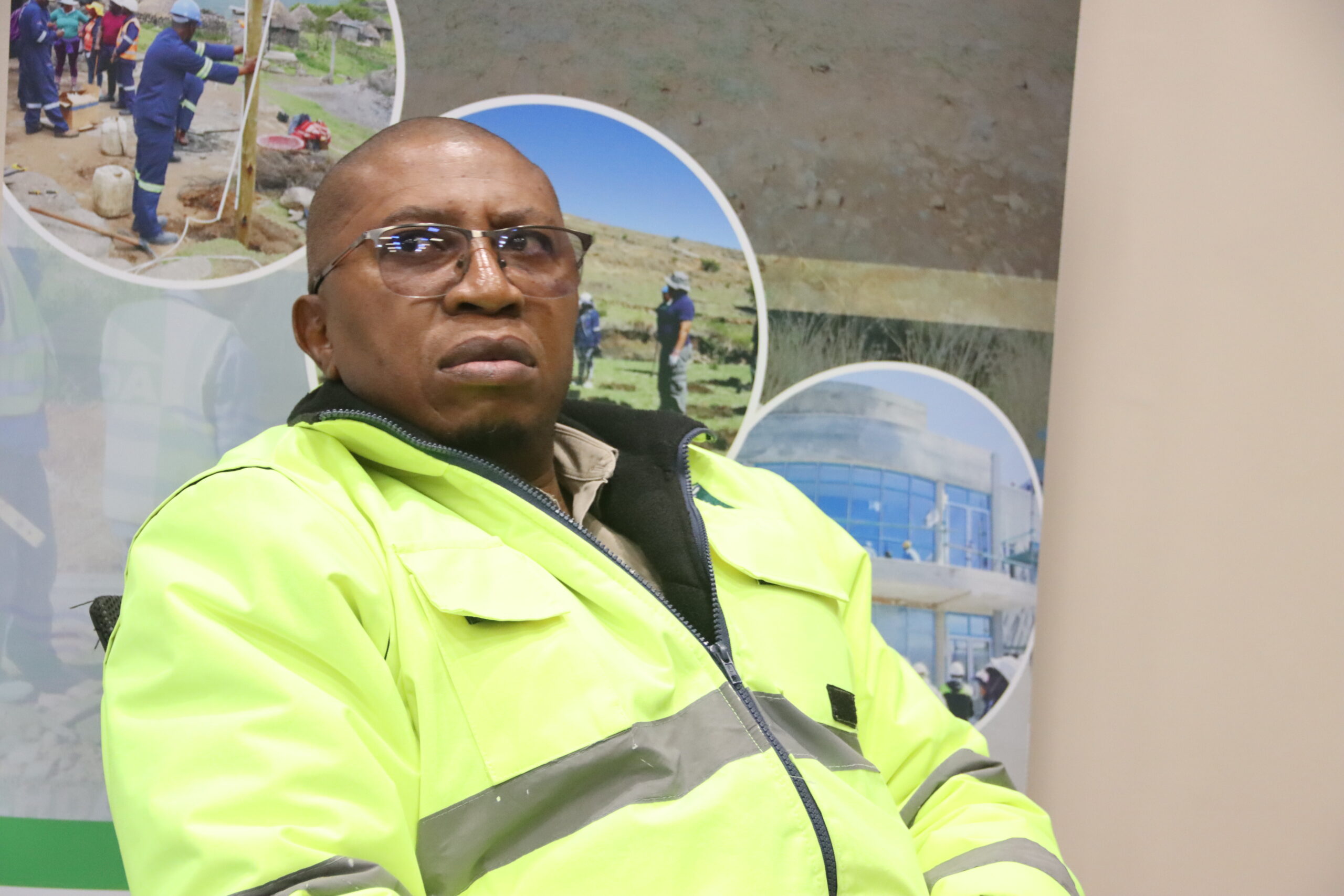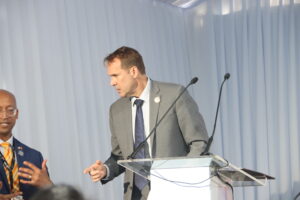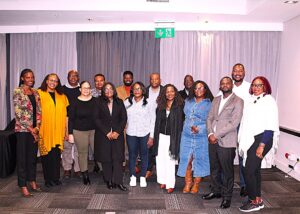The Lesotho Highlands Development Authority (LHDA), the implementing agency of the second phase of the Lesotho Highlands Water Project (LHWP II) recently started exhuming the bodies of people buried in the Polihali Dam area in Mokhotlong. The exhumations had a slow start on 10 June 2024 where the contractor only managed to exhume four bodies instead of the expected 10. However, the pace eventually increased as they got steady footing. Africa News 24 (AN24) managing editor, Silence Charumbira and Journalist ‘Mamphasa Monethi recently interviewed Polihali Operations Manager Gerard Mokone to discuss the progress of the multibillion maloti project and below are the excerpts of that interview.
AN24: Take us through the traditional rites which the LHDA performed for the affected families; who got what and what was the criteria?.
Mokone: I think the exhumations and reburial for development purposes, is something that is not so common. It doesn’t happen a lot because most of the time such things are avoided. Where a development like a road goes directly towards a graveyard, it is diverted. In our case, now that the water body will cover those many hectares of land, we had to relocate the remains, relocate the graves. We as a project, we rely on the community; the project affected persons on the decisions that we made, or on the execution of the project or implementation of the project. Even in this case, we had to consult with the people to find from them what their desires would be when we relocated the bodies of their buried ones (Sic). And we got cue from them, they indicated what was supposed to be done when such relocations were supposed to be done. In short, LHDA did not decide; it’s the people who decided what they wanted and…they indicated that there must be some form of a feast to notify the ancestors of the journey that they (the deceased) were about to take from where they were buried to a different graveyard.

After having consulted with the communities, we determined that there must be some form of compensation or assistance towards the communities or households carrying out the ceremonies that are required to buy a beast or to brew traditional beer and to invite people to come and have that ceremony together and to go to the graveyard and to talk to those buried there to say now we are preparing to take you to a different place. That is exactly what happened; we gave compensation to the affected households.
Each household had an equal amount. It’s not for each and every grave, but it’s for a set of graves that each household has. That compensation is about M18 000 that we gave to each household and we believe that amount can cover the necessary costs to carryout that kind of ceremony.
Apart from that, the other thing that we did was to organise a feast or ceremonies for each of the villages that are involved or affected. In this case, we had two communities and basically, each of the communities were provided with the necessary requirement that they indicated (that they needed) for the ceremony. They did the ceremonies last week and now it is up to each individual household to decide whether they do the ceremony or not…
Maybe calling it compensation could not be so accurate. It is money that is given to a household to do the ceremony; to buy the beast, ingredients for brewing (traditional beer), groceries for the ceremony. That is essentially what the money is for. The criteria was that we looked into the costs that would be incurred in holding such a ceremony and we increase that amount annually based on the consumer price index (CPI). We believe that money is sufficient to cover the costs for the (individual) household ceremony.

AN24: How many graves are being relocated or anticipated to be relocated? How many families or households are affected.
Mokone: The initial stage is that when we registered the graves, is that we found 444 graves that were going to be affected by the reservoir but life continues; people are being born and others are dying and the number is not going to be consistent. In the end, it could be just over 450 depending on the deaths registered in the area… At this point, I would say that we have 164 families that are affected by the relocation of graves.
AN24: Factoring in the delays that have already been encountered, how long is the process expected to take for the first phase?
Mokene: We have a period of about three months during which the relocation of graves within these three villages and the delays that we experienced, yes there was four, I understand the plan was to relocate 10 on that day but we are going to be able to recover and (in) the three months, we would have done the work… like we all know, the first day of an activity, you experience some challenges, but I think now the contractor now has his act together and the progress is quite good in terms of how many bodies are they able to dig (up) and relocate in a day.
AN24: What criteria and parameters are being used for the relocation process, as it seems villagers are unclear about the process?
Mokene: All the graves that are going to be under water are going to be moved. (But) that also depends on the household. A household can decide, “don’t move my (relative’s) grave and they would do some ritual (and) they would call those bodies in the manner that they decide to do; their own way without necessarily physically relocating the bodies. Some say they do it spiritually. We don’t determine which bodies must be relocated, it is all dependant on the households.
The process that we followed was that we engaged with the communities, with the households on the process that would be followed and as it is, as far as I know, all the remains are going to be moved and households, I am pretty sure are clear on the process. The consultant had a number of engagements with the communities, particularly with the households to agree on the process that was to be followed, hence each of the households has been issued the money…and during that process, the registration and the agreement on the dates of the relocation; all those things have been agreed and discussed with the communities and their leaders.

AN24: How is compensation for the graves going to be done and when?
Mokone: They are getting money for the ceremony. There is no specific compensation; to say we are paying so much for a body or a set of remains for a particular household, no. There is no compensation specifically for the removal of a body, there is none. And that’s what has been agreed that we will give you money for you as a household to do your ceremony. But all other costs related to the ceremony are borne by the project. Talk of engaging the consultant, the workers, the coffin… because we are using new coffins for the remains, all those costs are the responsibility of the project. As a result, the only money that is given (to the households) is for the ceremony that households may decide (to hold or not to hold). Remember, we have done the ceremony for the (entire) community and some households believe that was good enough and that the money may serve other purposes…
AN24: Please take us through the compensation process( For everything that’s being affected).
Mokone: The compensation rates were given to the LHDA by the two governments and all that we are doing is implementing. We don’t necessarily determine the rates but we use the rates that have been approved to calculate the compensation for each of the affected household. And the amount of money that the household receives as compensation, depends on the extent or the amount of impact that each of the household has suffered.
Related article
Polihali woman, ‘Maitumeleng Raise’s encounter with loved ones’ decades old graves

It is obvious that when the impact is smaller, the compensation will not be equal to that received by a household that has suffered a bigger impact on their assets. So, the rates are there and we only apply them as approved by the two governments in 2016 but of course, they are being escalated annually based on the CPI as provided by the Central Bank of Lesotho.
AN24: When is the community resettlement process going to start and how long is it expected to take?
Mokone: Resettlement has started. Up to now, we have resettled 23 households, I think. This is because they were affected, or they were going to be affected by different contracts. We have resettled housed holds that were going to be affected by the road between Mapholaneng and Polihali, we have resettled some of the households that were going to be affected by the road between Polihali and Ha-Seshote, we have resettled households that were affected by the quarry on the other side of the side of the tunnel outlet, Liphofung area. And now, we are moving onto resettling communities that are going to be affected by the impoundment around the site establishment here. We are at a stage where the contractor is going to be appointed soon having gone to the market and issued a tender…and we are currently negotiating with the contractors.
That means before the end of this year, we are going to see resettlement happening around this area (Polihali) starting with the community at Tlhakola. We have started construction of resettlement houses for a community named Lits’otsong, which is also going to be affected by the reservoir but since it was closer to the quarry works, we have commenced with the resettlement.

With the other communities, it is planned to happen depending on construction impacts.
We are also considering in our programme the impoundment, the date on which we are going to start collecting water. That is the deadline for us. By that time, which is towards the end of 2025, all communities would have been relocated.
We have communities like Phohla, we have started the relocation process in the sense that we have identified the relocation sites, we are working on getting water and other amenities for those communities so that when we start the relocations, everything necessary would have been in place by that time.

Relocation has been communicated with the communities; we have not been so specific with the dates but we have made it clear that before impoundment, relocation would have been done and completed and that is before the end of 2025. If there are any delays, then some time in 2026, all the relocations would have been done.
This has been communicated but when you are dealing with communities, sometimes you are specific and give dates but in construction there could be delays and we avoid giving people tentative dates because sometimes they hold you to it…so we are careful how we communicate so that we do not bring confusion and bind ourselves to timelines that we cannot necessarily achieve.
AN24: What has caused the lengthy delays in moving certain communities which were promised they will be moved e.g Ha Phohla?
Mokone: We are aware of the situation at Ha-Phohla and we have been very considerate on the decisions that we took on the part of the community that is going to be relocated and part of the community that is not directly affected by the project in terms of reservoir itself and the water body itself. We looked into the socio-economic factors, we looked into the economic factors, we looked into all the factors that could be looked into before deciding we can go as far as this many households and these others that are located in certain locations, we do not have reason to relocate them.
This story is part of a special series to be published until next week in collaboration with Seinoli Legal Centre.












